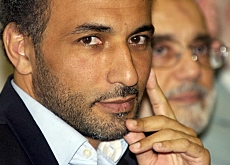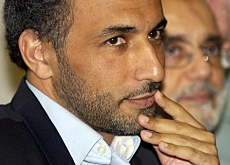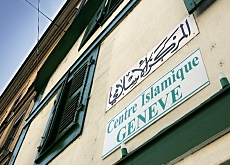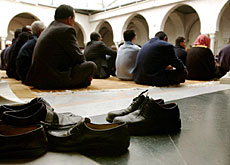“Islam is now a European religion”

Swiss intellectual Tariq Ramadan tells swissinfo that Muslims in Europe should not be defined by religion, but seen as members of the society in which they live.
Ramadan, who recently took up an advisory role for the British government on Islamic extremism, says that Islam is now a European religion, and should be recognised as such.
The Geneva-born philosopher is visiting fellow at St Antony’s College at Britain’s Oxford University.
A controversial figure, Ramadan had his visa to the United States revoked last year, preventing him from taking up a professorship at Notre Dame University in Indiana.
Ramadan said the ban was unjustified and rejected the “untrue and humiliating” claims that he was barred because of ties to terrorism.
The 43-year-old is the grandson of Hassan al-Banna, who founded the prominent Islamic movement the Muslim Brotherhood in 1928.
Accused of supporting attacks in Israel and Iraq, Ramadan has publicly condemned the September 11 and London attacks and says he is against the taking of innocent life.
While he has a popular following among European Muslims – especially in France – Ramadan has been banned from Muslim countries such as Saudi Arabia, Egypt and Tunisia.
swissinfo: So who is Tariq Ramadan?
Tariq Ramadan: My profession is teaching. I work at two different levels. Within academia, I work and write on religious, legal, political and social issues. I also want to remain connected with the grassroots, with people, trying to find concrete solutions. I am an activist scholar. I have never claimed to be a Muslim intellectual, but I have been defined in such a way by people not willing or not able to acknowledge the academic and universalist dimensions of the Islamic tradition.
swissinfo: Does your new position at Oxford compensate the fact that you were barred from a teaching position in the US?
T.R.: No, and there is no need for compensation. I was ready to move to the US permanently. Academic circles there gave me huge support when the American authorities revoked a visa I got after two months of clearance procedure. Even in the Bush administration people like [former Secretary of State] Colin Powell understood that they made a mistake and asked me to re-apply. Other people in this administration do not want my strong critical voice to be heard in the US.
When I see how this administration behaves, to be banned by it is more a recognition than a humiliation. But I don’t hold a grudge. The position I have now in Britain is interesting and there seem to be some good opportunities for the future.
British society is more knowledgeable about the Muslim world than Americans are. The British have a different approach to the US. But we shouldn’t confuse the United States with the few neo-conservatives who are close to President Bush and ruling the country.
swissinfo: Some sections of the media don’t seem to like you. Why?
T.R.: There are a lot of people who support my work, just like there are many who criticise it. I knew from the beginning that not everybody would appreciate my work. I try to build bridges between two worlds that don’t know each other very well. There are people who consider that I am too much of a Westerner and others who think I am too Muslim. I disturb people because what I say goes against their old certainties, some of their prejudices and even their doubts. I accept the criticism I face in the Muslim world, just like I take criticism from Westerners.
The vast majority of my critics come from France. I think I disturb people [there] because I talk about religion, which has always been, beyond Islam, a hot-button issue. There is also a problem for some with the fact that Muslims are now French citizens who want the same rights as everyone else. I’m not appreciated because I tell the French they need a reality check and I personify their fears. I accept that as well, it is a transitory but necessary tension.
swissinfo: You seem to be saying there are second-class citizens in France. Given the events taking place there now, has integration of other communities, such as Muslims, failed?
T.R.: I think it’s wrong to say a system has failed. Each society can find solutions to problems such as those faced by France if there are politicians brave and creative enough to take them on. But it’s true that in France the debate on Muslims has focused on religion, secularism and the veil – which is in my view wrong – rather than the fact that most Muslims are perfectly culturally and religiously integrated.
We have to realise that Islam is now a European religion, that French Muslims are first French citizens and democrats. The problems are social and we are dealing with a socio-economic crisis. The situation in France is such that there are second-class citizens who are not recognised by society and have no access to jobs or decent accommodation.
swissinfo: You are a Swiss citizen. Do you think the same kind of problems could appear in Switzerland?
T.R.: I don’t think so. There aren’t the same social problems. There aren’t the ghettos you see in France. But we need pre-emptive policies.
The real problem is that some people are raising non-existent issues and are fuelling the policies of the far right or the Swiss People’s Party. They might not get more votes out of it, but it influences other politicians and the public. Part of the right uses fear of Muslims to mobilise voters. The risk is that this may lead to a breakdown in communication between communities and citizens.
swissinfo: So what is the place of a Muslim in Europe today?
T.R.: Our identities have multiple dimensions. I am used to saying about myself: I am a Swiss by nationality, my culture is European, my heritage is Egyptian, I am a Muslim by religion and my principles are universalist. To be able to say this means that you are self-confident. It’s when you don’t feel comfortable with yourself, with society, that you reduce your identity to one single and closed dimension.
To be confident, you have to respect yourself, feel respected, understand the diversity of society, and be recognised by that society. A contemporary European Muslim today must be a citizen of his country, be a witness to his beliefs and be coherent in his actions. And I feel this should be the same for a Jew, a Christian, a Buddhist or an atheist.
swissinfo-interview: Scott Capper
Swiss citizen and Islamic scholar, 43-year-old Tariq Ramadan has emerged as a respected voice for Muslims in Europe.
His maternal grandfather is Hassan al-Banna, the founder of the Muslim Brotherhood in Egypt.
His father, Said Ramadan, fled Egypt due to the persecution of that organization, and settled in Switzerland.
Ramadan studied philosophy and French literature, having two doctorates, one in Philosophy, and the other in Islam.
In October 2005, he started teaching at St Antony’s College at the University of Oxford on a visiting fellowship.

In compliance with the JTI standards
More: SWI swissinfo.ch certified by the Journalism Trust Initiative



You can find an overview of ongoing debates with our journalists here. Please join us!
If you want to start a conversation about a topic raised in this article or want to report factual errors, email us at english@swissinfo.ch.